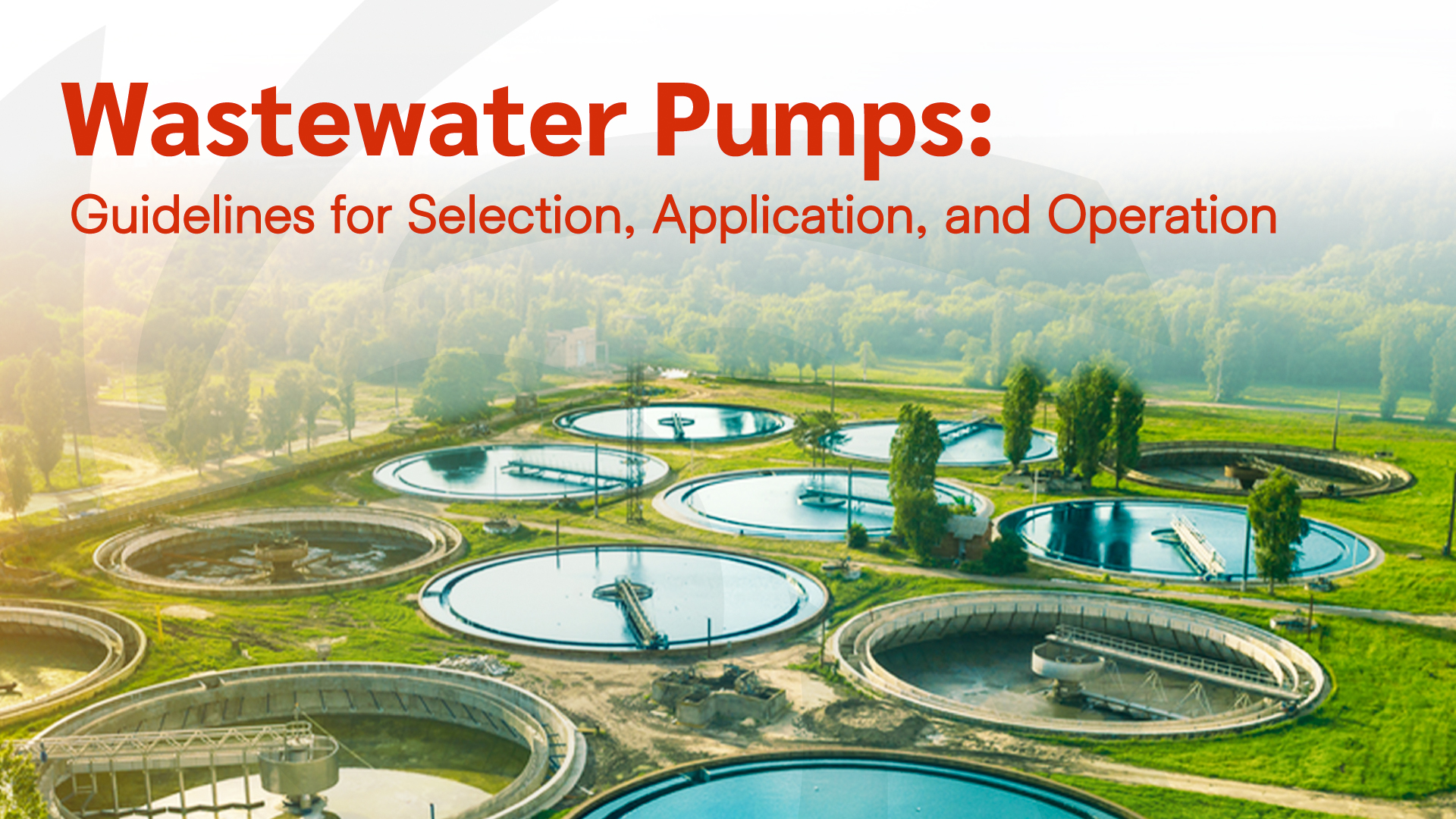
Wastewater Pumps: Guidelines for Selection, Application, and Operation
29-04-2024
Wastewater treatment plants are essential infrastructure that ensures the safe disposal or reuse of wastewater, protecting public health and the environment. Central to the effectiveness of these facilities are wastewater pumps, which play a critical role in conveying, treating, and managing wastewater throughout the treatment process. In this comprehensive guide, we’ll delve into the key considerations for selecting, applying, and operating wastewater pumps, empowering professionals to make informed decisions and optimize the performance of their treatment plants.
Understanding Wastewater Treatment Plant Pumps:
Wastewater treatment plants are intricate systems designed to remove contaminants and pollutants from wastewater before its safe discharge into the environment. Central to this process are pumps, which play a crucial role in conveying wastewater through different treatment stages, including screening, sedimentation, biological treatment, and disinfection.
The selection, application, and operation of pumps directly impact wastewater treatment processes’ efficiency, reliability, and effectiveness. Wastewater pumps are specialized devices designed to handle the challenging and often corrosive conditions in wastewater. These pumps are used in various operations, including:
- Transferring raw wastewater from collection systems into treatment processes.
- Distributing treated water for discharge or reuse.
- Circulating fluids within treatment tanks and reactors.
- Injecting chemicals for disinfection or pH adjustment.
Guidelines for Selection:
Selecting the right wastewater pump requires careful consideration of several factors to ensure compatibility with the facility’s needs and operating conditions. Key guidelines include:
Performance Requirements:
Determine the required flow rate, head pressure, and fluid characteristics (such as solids content) to match pump specifications to process demands. Consider variations in flow rates and peak demand to avoid under-sizing or over-sizing pumps.
Material Compatibility:
Choose pump materials resistant to corrosion, abrasion, and chemical degradation to withstand the harsh condition of wastewater. Stainless steel, bronze, and specialised coatings are common choices for pump components.
Energy Efficiency:
Select pumps with high-efficiency motors and variable Frequency drives (VFDs) to minimise energy consumption and operating costs. Evaluate lifecycle costs, including energy usage and maintenance expenses, to identify the most cost-effective options.
Reliability and Maintenance:
Give preference to pumps with proven reliability and low maintenance requirements to minimize downtime and operational disruptions. Consider accessibility for maintenance tasks such as inspections, repairs, and component replacements.
Applications and Operation:
Wastewater pumps find applications across various treatment processes, including:
Raw Wastewater Pumping:
Submersible pumps are commonly used for lifting raw wastewater from collection sumps or lift stations into treatment facilities.
Raw Wastewater Pumping:
Centrifugal pumps are suitable for transferring raw wastewater through pipelines and channels due to their high discharge and efficiency.
Treatment Process Pumping:
Positive displacement pumps are utilised for metering and injecting chemicals, such as disinfectants and coagulants, into treatment processes with precision.
Air-operated diaphragm pumps are employed for sludge dewatering and transferring thickened sludge to dewatering equipment.
- Proper Sizing: Ensure the pump is sized correctly to match the hydraulic requirements of the system, preventing under or oversized pumps that can lead to inefficiencies and premature failures.
- Installation Considerations: Install pumps in locations that minimise the risk of cavitation, air entrainment, and sediment accumulation. Follow manufacturer recommendations for proper alignment, anchoring, and support.
- Control and Monitoring: Implement control systems and monitoring devices to regulate pump operation, detect anomalies, and optimise energy usage.
- Regular Maintenance: Establish a proactive maintenance schedule to inspect, lubricate, and service pumps regularly. Address any issues promptly to prevent downtime and costly repairs.
Guidelines for Operation:
Proper operation of wastewater treatment plant pumps is essential for maintaining system efficiency and reliability. Follow these guidelines:
- Operating Parameters: Operate pumps within their specified operating parameters to avoid excessive strain, overheating, and premature wear. Monitor pump performance regularly and adjust operating conditions as necessary.
- Troubleshooting and Maintenance: Train plant operators in troubleshooting techniques and maintenance procedures to identify and address pump-related issues promptly. Keep detailed records of pump performance, maintenance activities, and repairs for future reference.
Emergency Preparedness: Develop contingency plans and emergency response procedures to address pump failures, power outages, and other unforeseen events. Maintain backup pumps and spare parts to minimise downtime during emergencies.
Treated Effluent Discharge:
- Submersible effluent pumps are deployed for lifting treated wastewater from clarifiers or filtration systems to discharge points or storage reservoirs.
AQUA GROUP’s Solutions for Wastewater Treatment Plant Pumps:

At AQUA GROUP, we understand the critical role of pumps in wastewater treatment plants. Our comprehensive range of wastewater pumps is engineered to deliver superior performance, reliability, and efficiency in the most demanding applications. From submersible sewage pumps to dewatering pumps and industrial effluent pumps, AQUA GROUP offers innovative solutions tailored to meet the unique needs of wastewater treatment plants.
Our pumps are designed for reliability, efficiency, and durability, ensuring optimal performance in demanding wastewater treatment environments. For clarity on selecting the right pump for your wastewater treatment plant or to explore our range of wastewater treatment pumps, visit our Wastewater Pumps page.
In conclusion, selecting, applying, and operating wastewater plant pumps requires careful attention to performance, material compatibility, energy efficiency, and reliability. By adhering to the guidelines outlined in this guide and leveraging AQUA GROUP’s expertise and solutions, professionals can optimise the performance of their treatment plants, ensuring effective wastewater treatment and environmental protection. Trust AQUA GROUP for reliable pump solutions that ensure efficient and sustainable wastewater treatment processes. Contact us today to learn more and partner with us for your pumping needs.
